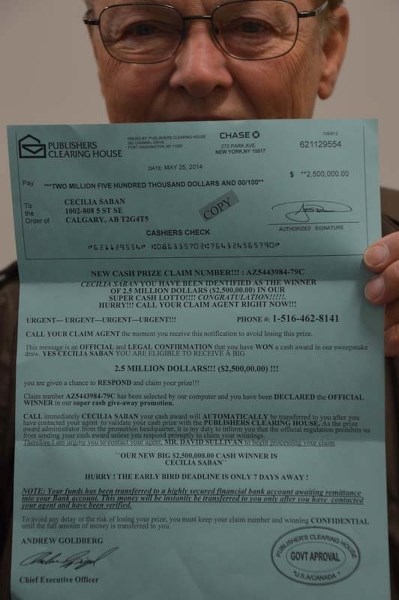A St. Albert senior citizen is warning his peers about a fraud claiming to represent a famous mailout organization.
Local resident Roger Eisworth dropped by the St. Albert Gazette with a letter he received on behalf of a friend who recently passed away. Eisworth said his wife was acting as executor of the friend's estate.
The letter claims to be from Publishers Clearing House, an American company well known for its distinctive envelopes and celebrity spokespeople.
However, upon closer inspection, Eisworth said it seemed to him the letter was not really from PCH, and suspected it was an attempt to rip off his friend.
"I'd received a lot of material from Publishers Clearing House because I'd read Reader's Digest," Eisworth said.
Was this another envelope from PCH looking to sell magazine subscriptions?
"No way," said Eisworth. "I've gotten previous ones."
"It's a scam. Plain and simple. The spelling is wrong.
"My guess is they want to get ahold of her bank account number."
The bottom of the letter has a statement that the $2.5 million is waiting for claim, and "This money will be instantly be (sic) transferred to you only after you have contacted your agent and have been verified."
The contact number is not a toll-free number, but rather a long distance call to area code 516. Area code 516 is an area code serving Nassau County, on Long Island, N.Y.
The letter's return address is 382 Channel Drive, Port Washington, New York and claims to be drawn on Chase Bank, New York. The return address on the envelope is Box 3082, Levis, Quebec.
Eisworth said the letter was not gold-foil stamped like real PCH material, and had a very amateurish look to it. It offered a prize of $2.5 million, urging the recipient to call a claim number. The letter has basic grammatical and spelling errors, and has a stamp at the bottom that says the sweepstakes has "Govt Aproval (sic)." "Approval" is spelled incorrectly.
Beware bogus offers
Publishers Clearing House's website has a section devoted to warning people about this scam.
"These offers are not affiliated in any way with Publishers Clearing House! The letter encloses a real looking check that may appear legitimate. Even your bank may be fooled," it says.
The warning goes on to explain that, even the the cheque is bogus, this may not be discovered for weeks. In the meantime, the victim may access some of the funds and send a payment to the scammers, as the letter requests.
This scenario always ends the same, with the scam victim paying twice, the site warns.
"You are responsible for checks or monies deposited into your account. When a check or money order bounces you will owe the bank the money you withdrew and the scammer will have the additional money sent in his/her pocket!"
A legitimate sweepstakes will never ask you to send money to enter a sweepstakes, claim a prize, or to pay a fee, tax or deposit, the site says.
Eisworth said he felt compelled to warn other seniors about this scam.
"The rule of thumb is if it sounds too good to be true, it is," he said.




